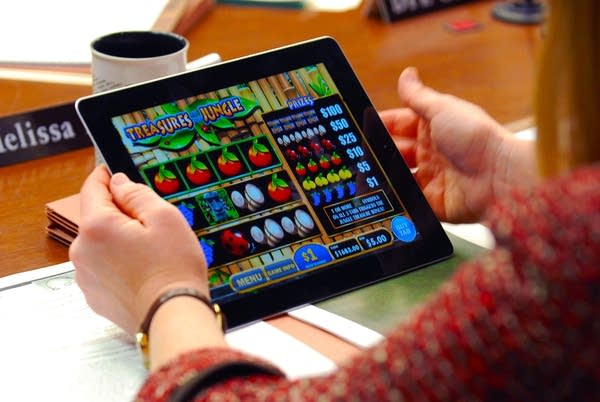Slow revenue from electronic pull-tabs concerns lawmakers
Go Deeper.
Create an account or log in to save stories.
Like this?
Thanks for liking this story! We have added it to a list of your favorite stories.

Lawmakers didn't much like what they saw when took a closer look at how the roll-out of new electronic pull-tabs was proceeding.
Eight months after the games were legalized to pay the state's share of the Vikings stadium, state officials concede they're likely to miss even revised estimates of how well electronic pull-tabs will do financially.
A House Commerce committee meeting Wednesday night was called to examine the plan to pay for a new Vikings stadium. The situation has Minnesota lawmakers at the Capitol pondering backups for their backup plans.
"I am more concerned than I was before the hearing started," said Rep. Joe Atkins, DFL-Inver Grove Heights. He chairs the House Commerce committee, which oversees charitable gambling, the lottery and betting at horse tracks.
Turn Up Your Support
MPR News helps you turn down the noise and build shared understanding. Turn up your support for this public resource and keep trusted journalism accessible to all.
Atkins called the meeting to check the progress of installing the electronic pull-tab games that were expected to be in thousands of bars and restaurants last fall.
"The newly revised revenue projections that came out, those are I believe its 120 sites we currently have," Atkins said. "It's anticipated based on what the Department of Revenue representatives said — that we'll have 2,500 sites in place by July 1. And I just don't know how realistic it is to expect a twenty-fold increase between today and July 1."
The new electronic pull-tabs were expected to be a nearly $1.4 billion boost to charitable gambling. Taxes on that gambling expansion have been earmarked for the stadium.

But electronic pull-tabs grossed about $4 million in their first three months of operation, far below expectations.
The games' average daily handles, or the bets they take each day, have also bumped down below half of last year's projections in recent weeks.
Minnesota has not yet borrowed the $350 million it pledged for the planned billion-dollar NFL stadium in downtown Minneapolis, so the finances have not reached a crisis. But the state does not have much time to figure out how to make the payments. Groundbreaking on the stadium is scheduled for October.
This is why she voted against the stadium deal in May, said Rep. Jenifer Loon, R-Eden Praire, who sits on the commerce committee.
"Actually it was one of my primary concerns, whether or not the funding stream was going to be adequate the state's portion, as allocated under the legislation," Loon said. "Clearly the estimates are not coming to fruition."
She's already running through some of the what-if scenarios.
"One of the issues we'd looked at was a ticket tax for people buying tickets at the stadium. We do that with other venues, whether its theaters or other things that are being renovated," Loon said. "I was disappointed that wasn't one of the fallback provisions. Maybe that's something to be looked at."
Some automatic backups are already built into the stadium plan, including a tax on suites and a sports-themed lottery game.
But lottery officials say the last Vikings-themed lottery game yielded only about $1.5 million for the year it was implemented, a far cry from the tens of millions in debt payments the state would need.
With a projection to build 150 stadium suites, a $1,000 per NFL game surcharge on each would only raise another $1.5 million.

Lawmakers on both sides of the aisle said it was too early to hit the panic button.
Al Lund, executive director of Allied Charities of Minnesota, represents about half of the state's charitable gambling operators. He assured lawmakers that bars, Legion clubs and bingo halls are still up for the challenge if they get the chance.
"We are pro electronics, we are pro stadium. I tell our charities, you can now point to that thing and say we helped build that. And we would ask for your patience," Lund said. "When the electronic bingo is available, when all the distributors that want to distribute electronics have products to sell, those numbers are going to go up exponentially, very quickly."
Lawmakers said they are now going to keep the stadium plan under close watch, and want a monthly report on how the business is shaping up.
• Follow Tim Nelson on Twitter: http://www.twitter.com/timnelson_mpr




